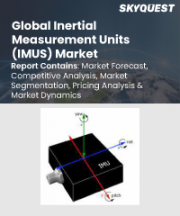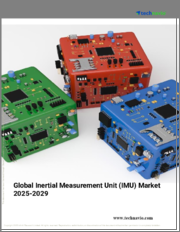
|
시장보고서
상품코드
1800864
관성측정장치 시장 보고서 : 구성요소, 등급, 기술, 최종 이용 산업, 지역별(2025-2033년)Inertial Measurement Unit Market Report by Component, Grade, Technology, End Use Industry, and Region 2025-2033 |
||||||
세계 관성측정장치 시장 규모는 2024년 270억 달러에 달했습니다. 향후 IMARC Group은 2033년까지 시장 규모가 732억 달러에 달할 것으로 예상하며, 2025-2033년 연평균 성장률(CAGR)은 11.12%에 달할 것으로 예측했습니다.
관성측정장치(IMU)는 물체의 직선 운동과 각도 운동을 측정하는 데 사용되는 독립형 시스템을 말합니다. IMU에 일반적으로 사용되는 장치에는 정밀 자이로스코프, 가속도계, 지자기계 등이 있습니다. 자이로스코프는 물체의 회전 속도와 회전수를 측정하고, 자력계는 신호의 자기 강도를 측정하고, 가속도계는 물체의 움직임과 방향을 측정하는 데 사용됩니다. 헬리콥터, 민간 항공기, 군용기, 장갑차, 드론, 미사일, 로봇, 각종 민수용 전자제품에 널리 사용되고 있습니다.
군사 장비 및 방위 시스템의 급속한 현대화는 시장 성장을 촉진하는 중요한 요소 중 하나입니다. 광섬유 IMU는 가혹한 기상 조건에서도 작동하는 무인항공기(UAV)의 자율 항법 시스템에 널리 사용되고 있습니다. 이들은 화재진압, 폭탄탐지, 정보-감시-정찰(ISR) 활동에 활용되고 있습니다. 또한, 가상현실/증강현실(V/AR) 시스템, 인공 환경 생성, 속도, 방향, 가속도 변화 측정에 제품이 널리 채택되고 있는 것이 시장 성장을 견인하고 있습니다. 또한, 차세대 스마트폰, 태블릿, 게임기 등의 방향 센서로도 사용되고 있습니다. 또한, 사물인터넷(IoT)과 통합 가능한 마이크로 전자기계(MEMS) 기반 IMU의 개발 등 다양한 기술 발전도 성장을 촉진하는 요인으로 작용하고 있습니다. 이 혁신적인 나노 IMU는 매우 컴팩트하여 경량화 및 소형화 장비에 널리 사용되고 있습니다. 기타 요인으로는 로봇 산업의 괄목할만한 성장, 광범위한 연구개발(R&D) 활동 등이 시장을 더욱 견인할 것으로 예상됩니다.
본 보고서에서 다루는 주요 질문
- 관성측정장치 세계 시장은 지금까지 어떻게 성장해 왔으며, 앞으로 어떻게 변화할 것인가?
- 주요 지역 시장은?
- COVID-19가 세계 관성측정장치 시장에 미치는 영향은?
- 구성요소별 시장 분석은 어떻게 되는가?
- 등급별 시장 분석은?
- 기술별 시장 분석은?
- 최종 사용 산업별 시장 분석은?
- 산업 가치사슬의 다양한 단계는 무엇인가?
- 업계의 주요 촉진요인과 과제는 무엇인가?
- 세계 관성측정장치 시장의 구조와 주요 업체는?
- 업계 내 경쟁은 어느 정도인가?
목차
제1장 서문
제2장 조사 범위와 조사 방법
- 조사 목적
- 이해관계자
- 데이터 소스
- 1차 정보
- 2차 정보
- 시장 추정
- 상향식 접근
- 하향식 접근
- 조사 방법
제3장 주요 요약
제4장 소개
제5장 세계의 관성측정장치 시장
- 시장 개요
- 시장 실적
- COVID-19의 영향
- 시장 예측
제6장 시장 내역 : 구성요소별
- 가속도계
- 자이로스코프
- 자력계
제7장 시장 내역 : 등급별
- 해양 등급
- 내비게이션 등급
- 택티컬 등급
- 우주 등급
- 상업용 등급
제8장 시장 내역 : 기술별
- 기계식 자이로
- 링 레이저 자이로
- 광섬유 자이로
- MEMS
- 기타
제9장 시장 내역 : 최종 이용 산업별
- 가전제품
- 항공우주 및 방위
- 자동차
- 기타
제10장 시장 내역 : 지역별
- 북미
- 미국
- 캐나다
- 아시아태평양
- 중국
- 일본
- 인도
- 한국
- 호주
- 인도네시아
- 기타
- 유럽
- 독일
- 프랑스
- 영국
- 이탈리아
- 스페인
- 러시아
- 기타
- 라틴아메리카
- 브라질
- 멕시코
- 기타
- 중동 및 아프리카
제11장 SWOT 분석
제12장 밸류체인 분석
제13장 Porter's Five Forces 분석
제14장 가격 분석
제15장 경쟁 구도
- 시장 구조
- 주요 기업
- 주요 기업 개요
- Analog Devices Inc.
- General Electric Company
- Honeywell International Inc.
- Northrop Grumman Corporation
- Robert Bosch Gmbh
- Safran
- STMicroelectronics SA
- Teledyne Technologies Inc.
- Texas Instruments Incorporated
- Thales Group
- Trimble Inc.
- Vectornav Technologies, LLC
The global inertial measurement unit market size reached USD 27.0 Billion in 2024. Looking forward, IMARC Group expects the market to reach USD 73.2 Billion by 2033, exhibiting a growth rate (CAGR) of 11.12% during 2025-2033.
The inertial measurement unit (IMU) refers to a self-contained system used for measuring the linear and angular motion of an object. Some of the commonly used devices in an IMU include, precision gyroscopes, accelerometers and magnetometers. The gyroscope can measure the rotational speed and rate of an object, a magnetometer is used to measure the magnetic strength of the signal and an accelerometer is used for measuring movement and orientation of the objects. They are widely used in helicopters, civil and military aircraft, armored vehicles, drones, missiles, robots and various consumer electronic products.
The rapid modernization of military equipment and defense systems represents one of the key factors driving the growth of the market. Fiber optic IMUs are widely used with autonomous navigation systems in unmanned aerial vehicles (UAVs) that can operate in extreme weather conditions. They are utilized for firefighting, bomb detection and intelligence, surveillance and reconnaissance (ISR) activities. Furthermore, the widespread product adoption for virtual and augmented reality (V/AR) systems and generating artificial environments and measuring alterations in speed, orientation and acceleration is providing a thrust to the market growth. They are also used as an orientation sensor in next-generation smartphones, tablets and gaming devices. Additionally, various technological advancements, such as the development of microelectromechanical (MEMS)-based IMUs that can be integrated with the Internet of Things (IoT), are acting as other growth-inducing factors. These innovative nano-IMUs are highly compact and are extensively used in lightweight and miniaturized devices. Other factors, including significant growth in the robotics industry, along with extensive research and development (R&D) activities, are anticipated to drive the market further.
Key Market Segmentation:
Breakup by Component:
- Accelerometers
- Gyroscopes
- Magnetometers
Breakup by Grade:
- Marine Grade
- Navigation Grade
- Tactical Grade
- Space Grade
- Commercial Grade
Breakup by Technology:
- Mechanical Gyro
- Ring Laser Gyro
- Fiber Optics Gyro
- MEMS
- Others
Breakup by End Use Industry:
- Consumer Electronics
- Aerospace and Defense
- Automotive
- Others
Breakup by Region:
- North America
- United States
- Canada
- Asia Pacific
- China
- Japan
- India
- South Korea
- Australia
- Indonesia
- Others
- Europe
- Germany
- France
- United Kingdom
- Italy
- Spain
- Russia
- Others
- Latin America
- Brazil
- Mexico
- Others
- Middle East and Africa
Competitive Landscape:
The report has also analysed the competitive landscape of the market with some of the key players being Analog Devices Inc., General Electric Company, Honeywell International Inc., Northrop Grumman Corporation, Robert Bosch Gmbh, Safran, STMicroelectronics SA, Teledyne Technologies Inc., Texas Instruments Incorporated, Thales Group, Trimble Inc. and Vectornav Technologies LLC.
Key Questions Answered in This Report:
- How has the global inertial measurement unit market performed so far and how will it perform in the coming years?
- What are the key regional markets?
- What has been the impact of COVID-19 on the global inertial measurement unit market?
- What is the breakup of the market based on the component?
- What is the breakup of the market based on the grade?
- What is the breakup of the market based on the technology?
- What is the breakup of the market based on the end use industry?
- What are the various stages in the value chain of the industry?
- What are the key driving factors and challenges in the industry?
- What is the structure of the global inertial measurement unit market and who are the key players?
- What is the degree of competition in the industry?
Table of Contents
1 Preface
2 Scope and Methodology
- 2.1 Objectives of the Study
- 2.2 Stakeholders
- 2.3 Data Sources
- 2.3.1 Primary Sources
- 2.3.2 Secondary Sources
- 2.4 Market Estimation
- 2.4.1 Bottom-Up Approach
- 2.4.2 Top-Down Approach
- 2.5 Forecasting Methodology
3 Executive Summary
4 Introduction
- 4.1 Overview
- 4.2 Key Industry Trends
5 Global Inertial Measurement Unit Market
- 5.1 Market Overview
- 5.2 Market Performance
- 5.3 Impact of COVID-19
- 5.4 Market Forecast
6 Market Breakup by Component
- 6.1 Accelerometers
- 6.1.1 Market Trends
- 6.1.2 Market Forecast
- 6.2 Gyroscopes
- 6.2.1 Market Trends
- 6.2.2 Market Forecast
- 6.3 Magnetometers
- 6.3.1 Market Trends
- 6.3.2 Market Forecast
7 Market Breakup by Grade
- 7.1 Marine Grade
- 7.1.1 Market Trends
- 7.1.2 Market Forecast
- 7.2 Navigation Grade
- 7.2.1 Market Trends
- 7.2.2 Market Forecast
- 7.3 Tactical Grade
- 7.3.1 Market Trends
- 7.3.2 Market Forecast
- 7.4 Space Grade
- 7.4.1 Market Trends
- 7.4.2 Market Forecast
- 7.5 Commercial Grade
- 7.5.1 Market Trends
- 7.5.2 Market Forecast
8 Market Breakup by Technology
- 8.1 Mechanical Gyro
- 8.1.1 Market Trends
- 8.1.2 Market Forecast
- 8.2 Ring Laser Gyro
- 8.2.1 Market Trends
- 8.2.2 Market Forecast
- 8.3 Fiber Optics Gyro
- 8.3.1 Market Trends
- 8.3.2 Market Forecast
- 8.4 MEMS
- 8.4.1 Market Trends
- 8.4.2 Market Forecast
- 8.5 Others
- 8.5.1 Market Trends
- 8.5.2 Market Forecast
9 Market Breakup by End Use Industry
- 9.1 Consumer Electronics
- 9.1.1 Market Trends
- 9.1.2 Market Forecast
- 9.2 Aerospace and Defense
- 9.2.1 Market Trends
- 9.2.2 Market Forecast
- 9.3 Automotive
- 9.3.1 Market Trends
- 9.3.2 Market Forecast
- 9.4 Others
- 9.4.1 Market Trends
- 9.4.2 Market Forecast
10 Market Breakup by Region
- 10.1 North America
- 10.1.1 United States
- 10.1.1.1 Market Trends
- 10.1.1.2 Market Forecast
- 10.1.2 Canada
- 10.1.2.1 Market Trends
- 10.1.2.2 Market Forecast
- 10.1.1 United States
- 10.2 Asia Pacific
- 10.2.1 China
- 10.2.1.1 Market Trends
- 10.2.1.2 Market Forecast
- 10.2.2 Japan
- 10.2.2.1 Market Trends
- 10.2.2.2 Market Forecast
- 10.2.3 India
- 10.2.3.1 Market Trends
- 10.2.3.2 Market Forecast
- 10.2.4 South Korea
- 10.2.4.1 Market Trends
- 10.2.4.2 Market Forecast
- 10.2.5 Australia
- 10.2.5.1 Market Trends
- 10.2.5.2 Market Forecast
- 10.2.6 Indonesia
- 10.2.6.1 Market Trends
- 10.2.6.2 Market Forecast
- 10.2.7 Others
- 10.2.7.1 Market Trends
- 10.2.7.2 Market Forecast
- 10.2.1 China
- 10.3 Europe
- 10.3.1 Germany
- 10.3.1.1 Market Trends
- 10.3.1.2 Market Forecast
- 10.3.2 France
- 10.3.2.1 Market Trends
- 10.3.2.2 Market Forecast
- 10.3.3 United Kingdom
- 10.3.3.1 Market Trends
- 10.3.3.2 Market Forecast
- 10.3.4 Italy
- 10.3.4.1 Market Trends
- 10.3.4.2 Market Forecast
- 10.3.5 Spain
- 10.3.5.1 Market Trends
- 10.3.5.2 Market Forecast
- 10.3.6 Russia
- 10.3.6.1 Market Trends
- 10.3.6.2 Market Forecast
- 10.3.7 Others
- 10.3.7.1 Market Trends
- 10.3.7.2 Market Forecast
- 10.3.1 Germany
- 10.4 Latin America
- 10.4.1 Brazil
- 10.4.1.1 Market Trends
- 10.4.1.2 Market Forecast
- 10.4.2 Mexico
- 10.4.2.1 Market Trends
- 10.4.2.2 Market Forecast
- 10.4.3 Others
- 10.4.3.1 Market Trends
- 10.4.3.2 Market Forecast
- 10.4.1 Brazil
- 10.5 Middle East and Africa
- 10.5.1 Market Trends
- 10.5.2 Market Breakup by Country
- 10.5.3 Market Forecast
11 SWOT Analysis
- 11.1 Overview
- 11.2 Strengths
- 11.3 Weaknesses
- 11.4 Opportunities
- 11.5 Threats
12 Value Chain Analysis
13 Porters Five Forces Analysis
- 13.1 Overview
- 13.2 Bargaining Power of Buyers
- 13.3 Bargaining Power of Suppliers
- 13.4 Degree of Competition
- 13.5 Threat of New Entrants
- 13.6 Threat of Substitutes
14 Price Analysis
15 Competitive Landscape
- 15.1 Market Structure
- 15.2 Key Players
- 15.3 Profiles of Key Players
- 15.3.1 Analog Devices Inc.
- 15.3.1.1 Company Overview
- 15.3.1.2 Product Portfolio
- 15.3.1.3 Financials
- 15.3.1.4 SWOT Analysis
- 15.3.2 General Electric Company
- 15.3.2.1 Company Overview
- 15.3.2.2 Product Portfolio
- 15.3.2.3 Financials
- 15.3.2.4 SWOT Analysis
- 15.3.3 Honeywell International Inc.
- 15.3.3.1 Company Overview
- 15.3.3.2 Product Portfolio
- 15.3.3.3 Financials
- 15.3.3.4 SWOT Analysis
- 15.3.4 Northrop Grumman Corporation
- 15.3.4.1 Company Overview
- 15.3.4.2 Product Portfolio
- 15.3.4.3 Financials
- 15.3.4.4 SWOT Analysis
- 15.3.5 Robert Bosch Gmbh
- 15.3.5.1 Company Overview
- 15.3.5.2 Product Portfolio
- 15.3.5.3 SWOT Analysis
- 15.3.6 Safran
- 15.3.6.1 Company Overview
- 15.3.6.2 Product Portfolio
- 15.3.6.3 Financials
- 15.3.6.4 SWOT Analysis
- 15.3.7 STMicroelectronics SA
- 15.3.7.1 Company Overview
- 15.3.7.2 Product Portfolio
- 15.3.7.3 Financials
- 15.3.7.4 SWOT Analysis
- 15.3.8 Teledyne Technologies Inc.
- 15.3.8.1 Company Overview
- 15.3.8.2 Product Portfolio
- 15.3.8.3 Financials
- 15.3.8.4 SWOT Analysis
- 15.3.9 Texas Instruments Incorporated
- 15.3.9.1 Company Overview
- 15.3.9.2 Product Portfolio
- 15.3.9.3 Financials
- 15.3.9.4 SWOT Analysis
- 15.3.10 Thales Group
- 15.3.10.1 Company Overview
- 15.3.10.2 Product Portfolio
- 15.3.10.3 Financials
- 15.3.10.4 SWOT Analysis
- 15.3.11 Trimble Inc.
- 15.3.11.1 Company Overview
- 15.3.11.2 Product Portfolio
- 15.3.11.3 Financials
- 15.3.11.4 SWOT Analysis
- 15.3.12 Vectornav Technologies, LLC
- 15.3.12.1 Company Overview
- 15.3.12.2 Product Portfolio
- 15.3.1 Analog Devices Inc.



















